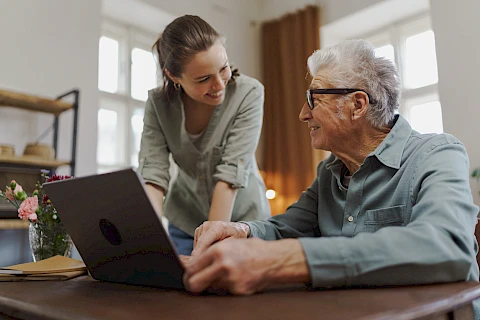
Social media is a great tool for connecting with friends and family, sharing memories, and staying updated on current events. For seniors, it offers an opportunity to stay socially active and mentally engaged. However, exploring social media can also bring risks if not done with care. That's where caregivers come in. As a caregiver, your role includes ensuring that your senior loved ones can enjoy social media without compromising their safety.
Mastering Privacy Controls
One of the first steps to helping seniors with social media is setting up privacy controls. Most popular platforms, such as Facebook and Instagram, have privacy settings that allow users to control who can see their posts and personal information. Emphasize the importance of keeping personal details—like home addresses, birthdays, and phone numbers—private. This can help protect seniors from potential threats.
Recognizing Potential Scams
Online scams targeting seniors are unfortunately common. Educate your loved ones on how to identify them. Here are some common scams to watch out for:
- Phishing attempts through emails or messages claiming to be from banks or well-known companies
- Fraudulent messages about winning lotteries or prizes
- Fake charity requests, especially after a natural disaster or during the holidays
To help recognize these scams, encourage skepticism about unsolicited messages asking for personal information. Teach them to check the sender's email address or profile for inconsistencies and advise them to verify the legitimacy of requests through official websites or phone numbers.
Creating Strong Passwords
Strong, unique passwords are a critical part of online safety. Weak passwords make it easy for hackers to gain access to social media accounts. Here are a couple of easy tips for creating strong passwords:
- Use a mix of letters (both uppercase and lowercase), numbers, and special characters.
- Avoid using easily guessable information like birthdays or pet names.
Managing these passwords can be challenging, especially if there are multiple accounts to keep track of. Consider using a password manager tool, which securely stores and organizes passwords. This makes logging in simpler and safer.
Safe Social Media Practices
Guiding seniors on how to safely share content is another crucial aspect of social media use. Remind seniors to think twice before posting personal details or sensitive information. Explain the risks of oversharing, such as revealing travel plans that could make them targets for burglars. Encourage skepticism towards unsolicited friend requests or messages, especially from unknown individuals.
Monitoring Online Activity
Regular check-ins on social media activity can help catch any red flags early. As a caregiver, keeping an open line of communication with your senior loved one about their online interactions is key.
Tools and apps can also assist in monitoring online behavior. Some software options allow you to alert loved ones to potential dangers and offer insights into their social media habits.
Help Seniors Stay Safe Online
Helping seniors navigate social media safely involves a combination of education, vigilance, and regular communication. Key safety tips include setting up privacy controls, recognizing potential scams, creating strong passwords, and practicing safe sharing habits.
As a caregiver, your involvement can make a significant difference in ensuring that your loved one enjoys a safe online experience. To learn about our personalized care and companionship services, contact us today at Senior Helpers Northern Utah. We proudly serve seniors and their families in Logan, Ogden, Smithfield, Roy, and Brigham City.